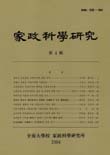- 영문명
- Dual career couples’ Role Expectancies and Role Conflicts
- 발행기관
- 전남대학교 생활과학연구소
- 저자명
- 김경신(Kyeong-shin Kim) 김오남(Oh-Nam Kim)
- 간행물 정보
- 『生活科學硏究』家政科學硏究 第4輯, 15~28쪽, 전체 14쪽
- 주제분류
- 자연과학 > 생활/식품과학
- 파일형태
- 발행일자
- 1994.12.30

국문 초록
영문 초록
The purposes of this article are to find out general trends of couples’ role expectancies and role conflicts according to wives’ employment, to estimate the differences of role expectancies and role conflicts according to sociodemographic and family-related variables and to analyze the effects of significant variables and role expectancies influencing on role conflicts.
The samples were selected from the employed wives and their husband, living in Kwang-ju. 169 couples’ data were used in final analysis. The data were analyzed by frequency, percentage, mean, paired t-test, one-way ANOVA. Duncan-test, Chronbach’s α, and multiple regression.
The results are as follows:
1) Employed wives and their husbands’ role expectancies were higher than their role conflicts. Husbands’ role expectancies were higher than wives’ but wives were higher than husbands in role conflicts. Especially, child rearing and housework demensions were relatively higher than others in role expectancies and conflicts.
2) In the case of husbands, role expectancies were significantly different according to the perception of family/employment importance and role conflicts were significantly different according to sex role attitude, support to wives’ employment. In the case of Wives, role expectancies were significantly different according to edu cation, husband’s income, her own income, job, unfairness perception, support of husband and parents in-law, job satisfaction. Role conflicts were significantly different according to marriage year, communication time and satisfaction with spouse, husband’s housework aid, unfairness perception, husband’s support to spouse’s employment, and job satisfaction.
3) From the regression analysis, it was found that husbands’ role conflicts were influenced by communication satisfaction with spouse, sex role attitude, perception of family/employment importance, and role expectancies. Wives’ role conflicts were influenced by communication satisfaction with spouse, husband housework aid, unfairness perception, sex role attitude, husband’s support to wife’s employment, and role expectancies.
In conclusion, It is very important to reduce dual-career couples’ role conflicts with high communication satisfaction with spouse, advanced sex role attitude, husband’s support, housework aid, and low role expectancies.
목차
Abstract
Ⅰ. 서론
Ⅱ. 이론적 배경
Ⅲ. 연구방법
Ⅳ. 연구 결과
Ⅴ. 요약 및 결론
참고문헌
키워드
해당간행물 수록 논문
참고문헌
최근 이용한 논문
교보eBook 첫 방문을 환영 합니다!

신규가입 혜택 지급이 완료 되었습니다.
바로 사용 가능한 교보e캐시 1,000원 (유효기간 7일)
지금 바로 교보eBook의 다양한 콘텐츠를 이용해 보세요!




